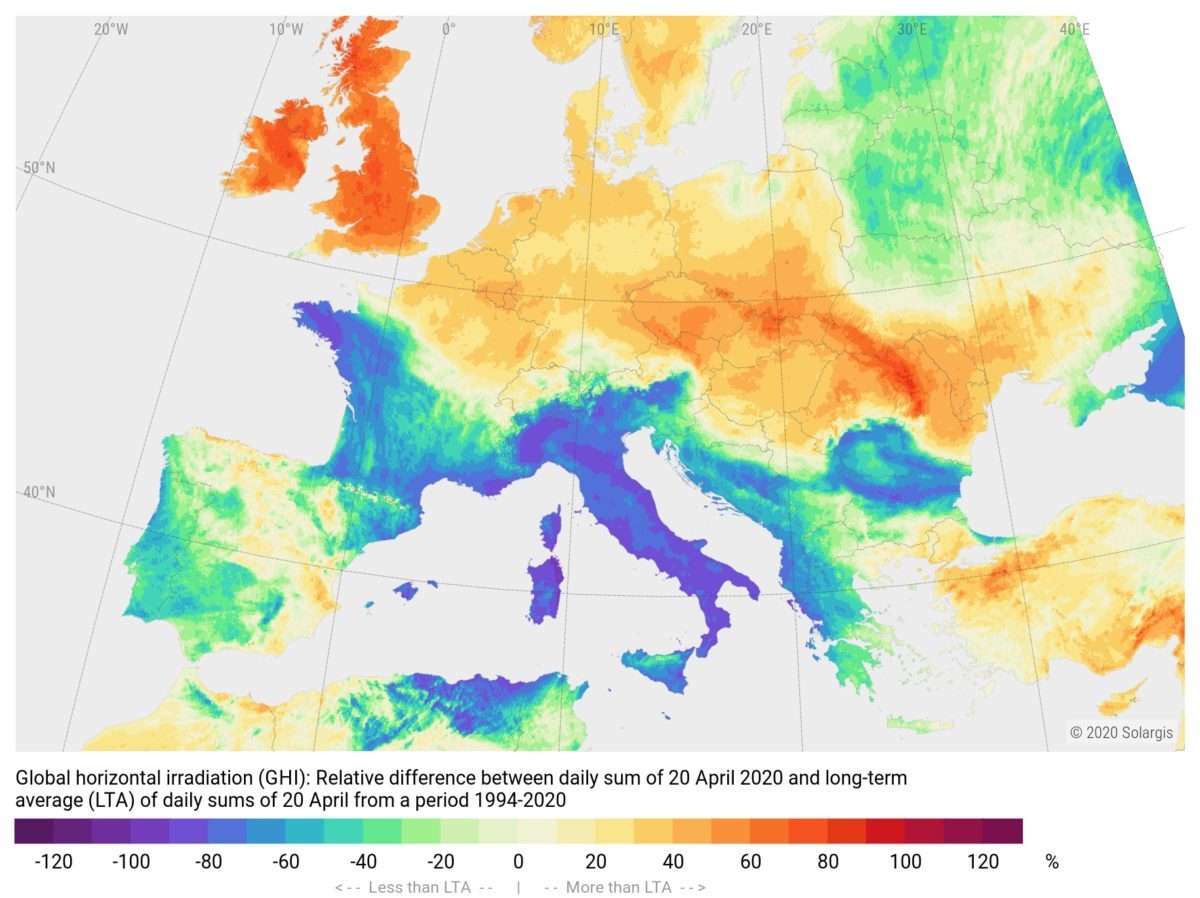From pv magazine global
Slovakian solar data company Solargis has predicted record daily solar power levels such as those witnessed recently in Spain, Germany and the U.K. will continue throughout the summer.
Solargis has highlighted the role even modest rises in the amount of solar irradiation hitting panels played in solar output records in the three European nations in the last two months.
The company said high levels of global horizontal irradiance (GHI) – the total volume of shortwave radiation from above which reaches surfaces angled horizontally – are expected during the summer and had already contributed to recent solar records.
Germany recorded 32.2 GW of solar generation on April 20, helped by GHI more than 50% higher than average for that time of year. With low temperatures also helping solar production that day, the U.K. posted its own solar record on the same date, with 9.68 GW of output helped by GHI that was 70% higher than usual.

Spain had already generated a record 6.3 GW of solar power on March 26, although Solargis noted GHI, despite being 70% higher than usual in the north west of the country, experienced only moderate gains elsewhere. The Slovakian business stated those GHI levels indicated the solar generation capacity added in Spain last year had also contributed to the record solar return, as was the case elsewhere in Europe. Reduced air pollution during Covid-19-related industrial shutdowns has also helped solar generation levels, Solargis added.
With solar’s share of national generation mixes leaping during the coronavirus-driven slump in energy demand – thanks to low costs and the priority status afforded state-subsidized renewables facilities versus fossil fuel generation – Solargis echoed claims made elsewhere that the exceptional nature of the present low-demand energy period offered a valuable insight into how future, renewables-led energy systems would function.
Plunging power prices, exacerbated by bumper volumes of solar power pose a risk of undermining the business case of renewables projects, particularly unsubsidized merchant facilities, Solargis added. The company has used the unique insight offered into future grid operation to stress how important it is for renewables investors and grid operators to possess up-to-date data of the type gathered by Solargis.
Insight
“The current situation has handed national grids, policymakers and the solar industry a valuable opportunity to understand how this volume of renewable generation can be managed in future, when renewables are set to make up a much greater part of the energy mix,” said Solargis MD Marcel Suri in a statement yesterday. “Most markets work on a target of 50% renewables by 2030 but many are approaching this already because of the combination of low [energy] demand during the lockdown and favorable weather.
“As the proportion of renewables in the European grid increases and we shift into a post-subsidy environment, accurate forecasting becomes increasingly essential for the operation of solar projects. During this lockdown, the energy industry will have a greater opportunity to witness what curtailment and price cannibalization look like in practice and we anticipate that this will drive investment in more sophisticated forecasting and grid management approaches.”
The Solargis boss added, the higher-than-usual irradiation levels witnessed last month could hint at changing climate patterns and would necessitate the need for solar datasets to be updated to keep pace with the effects of climate change.
This content is protected by copyright and may not be reused. If you want to cooperate with us and would like to reuse some of our content, please contact: editors@pv-magazine.com.









By submitting this form you agree to pv magazine using your data for the purposes of publishing your comment.
Your personal data will only be disclosed or otherwise transmitted to third parties for the purposes of spam filtering or if this is necessary for technical maintenance of the website. Any other transfer to third parties will not take place unless this is justified on the basis of applicable data protection regulations or if pv magazine is legally obliged to do so.
You may revoke this consent at any time with effect for the future, in which case your personal data will be deleted immediately. Otherwise, your data will be deleted if pv magazine has processed your request or the purpose of data storage is fulfilled.
Further information on data privacy can be found in our Data Protection Policy.